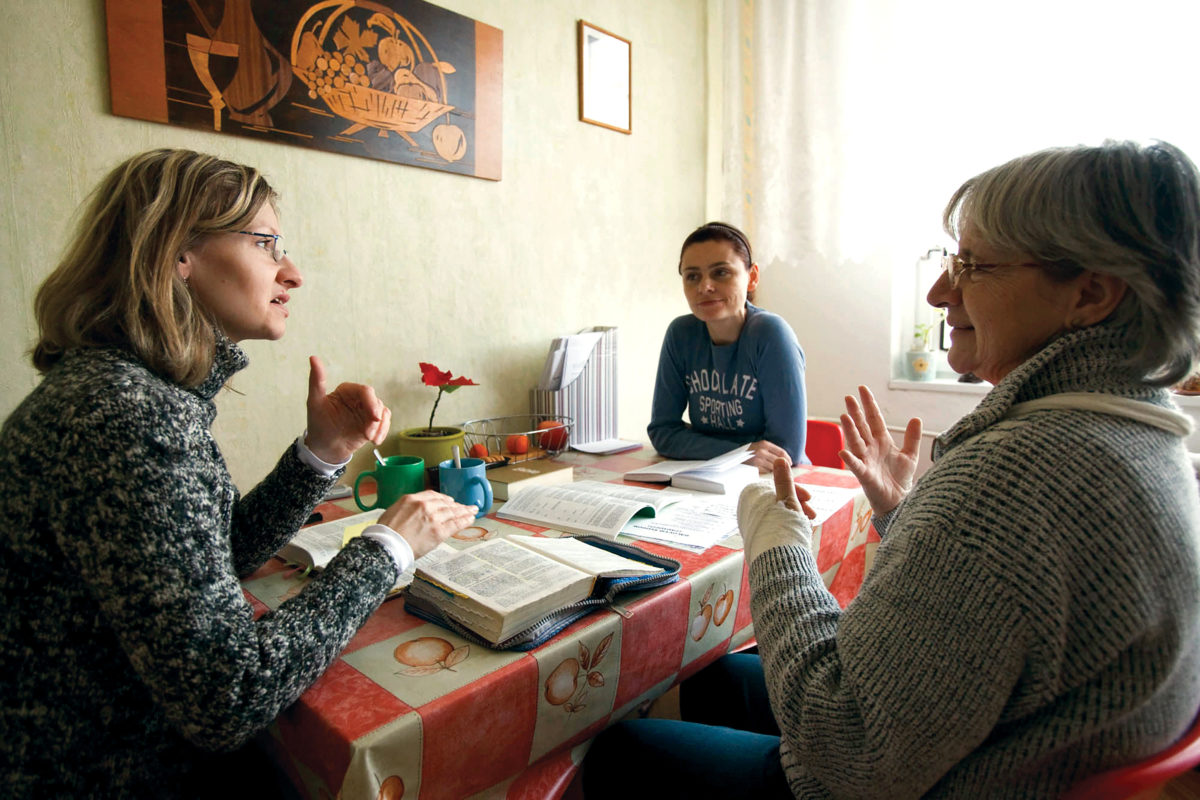EDITOR’S NOTE — This is the second of three articles on the need for missionary care. Read Part 1 here.
By Marianne Colee
Somerville, Alabama
Merriam-Webster defines compassion fatigue as “the physical and mental exhaustion and emotional withdrawal experienced by those who care for sick or traumatized people over an extended period of time; apathy or indifference toward the suffering of others as the result of overexposure to tragic news stories and images and the subsequent appeals for assistance.”
From nursing to a daughter who has been a caregiver for her parents for many years, I know from experience that compassion fatigue affects many more professions other than being a missionary.
Compassion fatigue and burnout go hand-in-hand. There is plenty of research and statistics on compassion fatigue and burnout. Numbers make my head spin, so you won’t get those numbers from me. There are a number of articles, websites, books, podcasts and organizations that work to bring awareness and aid to compassion fatigue and burnout. You’re welcome to do your own research.
I jotted down my thoughts on how the Church can help missionaries struggling with compassion fatigue. Here are five ways.
1. Wash their feet.
In the Bible, the washing of feet was a basic need and hospitality gesture that a guest would experience when entering a house. Feet are tired, dirty, hot and stink. No one wants to do that job. At the last Passover, Jesus showed His disciples that He was willing to do the worst job in the house — He cared for the worst part. He washed dirty, stinky, tired feet. He showed us how to serve others.
We need to get in the dirty, stinky, tired parts of life with missionaries and serve them. Wipe them clean with love by meeting their physical and emotional and mental and spiritual needs. We need to care for them as you would your sick child by not requiring anything of them and instead allowing them to rest and refill by bringing life and healing to them.
2. Don’t put missionaries on a pedestal or saddle them with unmeasurable expectations.
I believe part of the reason that burnout and compassion fatigue happen comes from the idea that missionaries have some sort of super-power to do it all and keep going. They don’t. Missionary work is WORK. Ministry is WORK.
No matter how much you love people and the work you are doing, you are a normal human being like everyone else on the planet. You get mad at your co-workers, there is competition between organizations and churches, there are personal family struggles, kids must go to school, they get sick, the list could go on and on. All of that adds up over time. I’m sure you’ve experienced that in your own life.
Missionaries do not have some sort of extra special connection to God. When churches send out or bring in missionaries that are on home assignment, expecting their life, marriage and kids to be perfect, it takes away from getting to know the real missionary and getting to see how God is working in their own personal lives — which is an overflow into their ministry.
3. Stop money shaming.
I don’t know if you know this, but missionaries live really interesting lives! Some really cool things happen to them. They see things that are wonderful and horrible, are able to do really neat things and travel to amazing places. Most of the time you would never know this. Their travels (vacations, periods of rest, etc.) are not shared because when you raise your own money and people give to you, sometimes “the giver” become very protective of their money they have given. They want to make sure the missionary uses the money given for the “right” things. What are the right things, anyway? Why did you really give the money?
It’s time to look at our giving and our thoughts attached to that giving. I agree: trusting your missionary to use the money given to them with integrity is imperative. But most likely the missionary family you support is more worried about how they are using their money than you are. They are ever-aware that support can end in the blink of an eye.
They are ever-aware that their time on the field and their ministry where they have poured out their hearts and souls could end before they want it to because of financial strain. They are ever-aware that their responsibility is to God, and they will be held accountable for how they spend the money given to them. They are ever-aware that their responsibility to God includes care for their family and themselves, so they are physically, mentally, emotionally and spiritually able to do the work He gave them to do.
That means buying clothes and shoes, food, school supplies, going on a vacation to a place that is considered exotic. If you have traveled overseas, you know that they are not blowing their money. In other parts of the world, plane tickets and lodging are not as expensive to “exotic” destinations. Sometimes a friend has paid for the family to have an entire week away on the beautiful beaches of Zanzibar or to go snow skiing in Switzerland.
If you have ever raised your own support, you know that you’re not “rolling in the dough.” Vacations and time away are often saved up for, just as you would save up your money here to go to Disney World or Hawaii.
4. Become a good listener and then speak words of life.
“Kind words are like honey — sweet to the soul and healthy for the body.” Proverbs 16:24
In order to speak kind, genuine words, you have to listen well. When you’re getting to know your missionary, their family, and what they do, listen with an open, practical heart. When you do, you will be able to speak words that are like honey and give life, words like:
- “That must be so hard.”
- “How did you handle that?”
- “What are your fears?”
- “What brings you joy?”
- “It seems like that challenge really strengthened you.”
- “How are your kids handling the culture in your host country lately?”
- “How can I help?”
I realize most of those words are questions. Listening to the answers of the hard challenges, hearing about the fears and joys of living away from their home country, noticing out loud where they seem to have grown in their own faith and trust with God, acknowledging that life as a missionary is hard — this may be the best thing you can do.
Missionaries know you can’t fix it or change things. It’s their life — they live on the field, and they can’t even fix it or change things! Missionaries just need someone to hear their stories — the good, the bad, the ugly, the hard, the joys, the fun, the crazy and weird. They need someone to laugh with them at the crazy, hard, weird things.
Knowing someone is listening and truly understands or is trying to understand then sympathizes with them is a gift to their soul. You will be a treasure to them forever.
5. Be a “haver.”
I have recently learned that “haver” is the Hebrew work for “friend” — not a fair-weather friend or a friend of convenience, but a friend who helps you carry the heavy things in life. We serve in Uganda where women and children are carrying water on the top of their heads from the bore hole all the way back to the house in jerry cans. The jerry can is heavy with water. It’s usually hot. Everyone gets sticky and sweaty. It’s tiring. They have to stop and rest along the way. Most of the time there will be a least two carrying water together. It’s a communal way of living in Uganda. People rarely do anything by themselves.
We need to learn a lesson from this way of life and live communally. We need to be willing to carry the heavy stuff with our missionary friends. They need help carrying their fears and doubts — they are working out their faith just as you are!
They have questions that are never answered about their circumstances or a situation they are dealing with. They have marriage struggles, kids that backtalk, throw tantrums and fight with their siblings. They have people in their communities they don’t get along with. They have disagreements with leadership in their organization or among their team on the ground or even with local people and leaders.
The missionary community is better together when they are strong and unified.
If you catch yourself thinking: “Oh, you’re a missionary, shouldn’t you be a perfect Christian and not have these problems and struggles?” or “How can God use you on the field if you aren’t getting along with your team, your community, your spouse?”
Change your thoughts to think: “How can I listen with understanding, pray and give practical advice if asked?” Don’t be afraid to share your own similar experiences. Text at least once a month.
Tell them about your daily, boring life of mundane dish washing, laundry, the commute to work and how school is going for the kids. Ask about their boring, daily life of mundane dish washing, laundry and their commute to work — which can be interesting! Ask how are the kids doing with school and what they cooked for dinner. Tell them about a book you’re reading or recommend a movie for family movie night. Ask what songs they are listening to that week. Ask them for advice on how they handled that kid’s sickness or tantrum or sassy teen who hates their life. The sky is the limit.
Need for encouragement
Missionaries need you, Church. The church in Philippi sent missionary care to Paul while he was in prison. They didn’t just send a box of food or presents — they sent a person! (Not knocking the gift boxes — those are always welcome!)
The church in Philippi sent Epaphroditus to care for Paul’s needs. Imagine how loved and seen and even relieved Paul might have felt to see a friend, a face he knew coming to care just for him. Missionaries have needed the Church since the beginning of the Church, and that won’t change.
If you can (or are allowed to visit, depending on the country of service), make plans for a team from your church to visit your missionary in their host country, even if it’s just once. It will make all the difference in the world in them, in their ministry and in you.






Share with others: